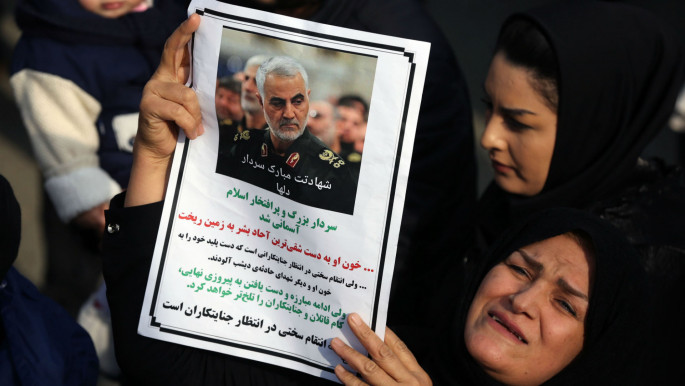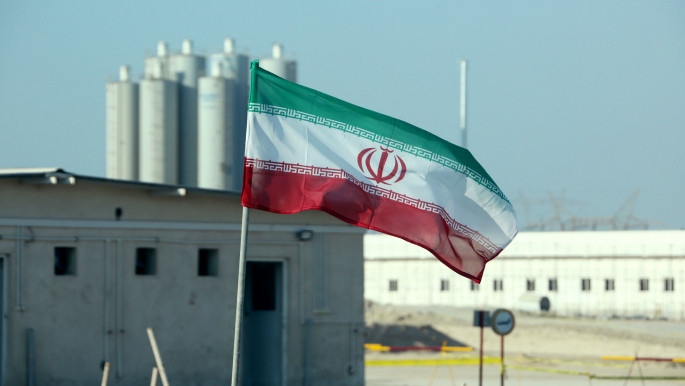Why Turkey wants to avoid taking sides in the US-Iran standoff
Turkey has watched the tense standoff between the United States and Iran in Iraq this month with concern since heightened US-Iran tensions, or the prospect of war breaking out between those two powers is not in its interests.
The US killed Iran's Islamic Revolutionary Guard Corps' [IRGC] extraterritorial Quds Force commander Qasem Soleimani in a drone strike in Baghdad on January 3. Two days later in an interview, Turkish President Recep Tayyip Erdoğan used respectful words when talking about the late commander but was also notably "restrained".
Ankara wants to avoid either siding with the US in any conflict with Iran or heeding Iranian President Hassan Rouhani's call for Tehran's allies and neighbours to side with it in opposition to the American presence in the region.
Suleyman Ozeren, a Turkey expert at George Mason University, described Soleimani's death as a "shocking moment" for Ankara.
"Although his spokesperson denied it, Erdoğan himself has not made any statement dismissing Iranian reports that he described Soleimani as a martyr," Ozeren told The New Arab.
"Ankara was caught unguarded and struggled to find an appropriate response."
 |
Ankara has few other choices aside from retaining its neutral position since taking either side could prove very costly for it |  |
According to Ozeren, Erdoğan enforces this "seemingly balanced approach" due to his fear that "any political turmoil and sudden regime change could have a spillover effect in Turkey."
 |
| Read also: The significance of Qasem Soleimani's assassination |
"Any military escalation in Iraq between the US and Iran would create new waves of refugees entering Turkey and more complications on the future of the Kurdish issue, similar to the challenges in Syria," he said.
Consequently, Ankara has few other choices aside from retaining its neutral position since taking either side could prove very costly for it.
"The exception would be for Turkey to increase its military presence in northern Iraq to preserve its gains in that region," Ozeren said.
However, he went on to warn that "any heightened Turkish military involvement in Iraq could trigger new unknowns."
Political analyst Ali Bakeer also noted that Ankara has no interest in becoming involved in the US-Iran standoff.
"The fact that it has its own regional challenges and totally different priorities than that of Iran and the US makes it more sensible for Turkey to stay away from the current crisis," Bakeer told The New Arab.
"Ankara is trying to convince both to de-escalate while simultaneously looking out for any opportunities of using their conflict to its benefit."
 |
The fact that it has its own regional challenges and totally different priorities than that of Iran and the US makes it more sensible for Turkey to stay away from the current crisis |  |
Any escalation, he said, "might have mixed results on Ankara." For example, a weakened US presence in Iraq could potentially push the Iraqi Kurds and Sunnis "towards Ankara in order to balance with Iran."
If US troops leave Iraq in the near future, however, "then the upper hand in Iraq will be for Iran, and this is not good news for Turkey."
Ali Demirdas, professor of international relations and contributor to The National Interest, said that despite Tehran's policies in the region that are "detrimental to Turkey's interests" Ankara is opposed to any US-Iran conflict because it fears that could result in Iran becoming "another Iraq."
"This protective instinct is prompting the Turks into acting as a mediator between Washington and Tehran rather than picking a side and hoping for gains," Demirdas told The New Arab.
Also, in light of the fact it is presently involved in both the Syrian and Libyan conflicts, Turkey does not have "the means to pursue a zero-sum policy against Iran by siding with the US" in any confrontation, he said.
 |
|
| Read also: Is Iran's nuclear deal still viable? |
Demirdas pointed to Turkey's attempt with Brazil to broker an international deal on Iran's nuclear programme back in 2010 as an example of Ankara's "mentality of saving the Iran regime from totally collapsing, which would be catastrophic for Turkey."
Nevertheless, there are some scenarios under which Demirdas believes Turkey might side with the US in a confrontation with Iran.
One is if Washington moves "ahead with a plan aimed at preventing Iran from developing nuclear weapons" since Ankara "doesn't want a nuclear Iran."
Demirdas also believes that if the US makes "major concessions" to Turkey regarding the Kurdistan Workers' Party [PKK] group and Cyprus in return for its support in a conflict with Iran "Turkey will breeze towards Washington."
Erdoğan has helped Tehran evade US sanctions, resulting in the cases against Turkey's Halkbank and the Iranian-Turkish gold-trader Reza Zarrab in the United States. His involvement might potentially influence Ankara's response to heightened US-Iran tensions.
Ozeren noted that both cases "have been Erdoğan's liability all alone."
"Erdoğan's inner circle has been the chief accomplices in the evasion of sanctions conspiracy, according to the indictment," he said.
"The corruption that his inner circle was involved in remains his weakest spot, which Iran or the United States could leverage against him."
Ozeren also said that Erdoğan "cannot choose Iran over the United States, where Congress has already drafted a bill specifically targeting him."
 |
Erdoğan cannot choose Iran over the United States, where Congress has already drafted a bill specifically targeting him |  |
"So, he would do anything not to provoke either Iran or the United States."
Demirdas believes that while there are some issues over which Ankara is "prepared to butt heads with Washington", such as its Russian S-400 missile purchase and US support to the Syrian Kurdish [YPG], he doesn't believe "the Halkbank case is important enough for Erdoğan to side with Iran against the US."
According to Ozeren, Soleimani's death could ultimately end up benefitting Turkey in Syria if Ankara reaches a peace deal with President Bashar al-Assad.
"In the absence of Soleimani, Russia would be more persuasive about a potential peace deal," he said.
This, he added, is one of the reasons why Turkey's intelligence chief Hakan Fidan met with his Syrian counterpart in Moscow on January 13, marking the first official meeting between the Turkish and Syrian officials in years.
Ozeren concluded by pointing out that "from a broader regional perspective" Soleimani's killing was in fact "terrible news for Erdoğan and Fidan, who got along well with Soleimani, especially concerning tensions between Turkey and Saudi Arabia."
Paul Iddon is a freelance journalist based in Erbil, Iraqi Kurdistan, who writes about Middle East affairs.
Follow him on Twitter: @pauliddon





 Follow the Middle East's top stories in English at The New Arab on Google News
Follow the Middle East's top stories in English at The New Arab on Google News


